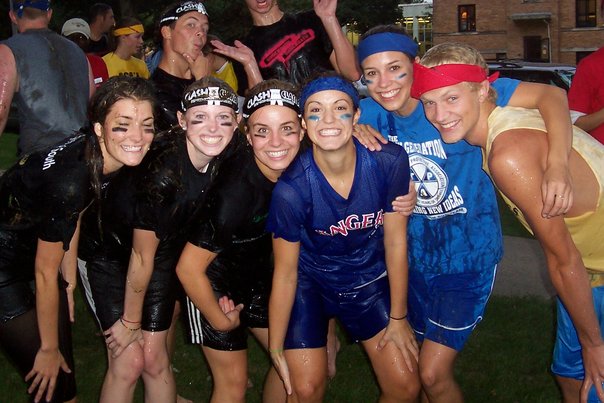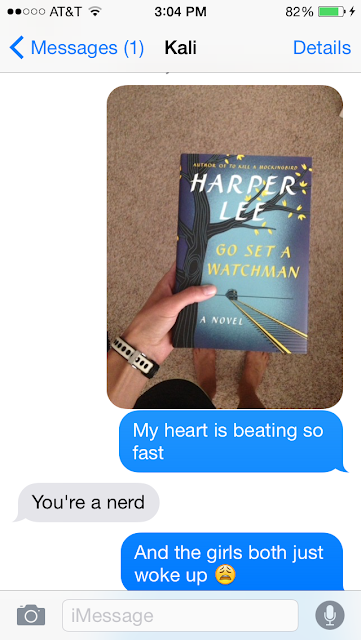Last
Monday I shared that I was anxiously awaiting Tuesday, when Harper Lee's "Go Set a Watchman" was released. [And then I took a week off blogging, which wasn't the plan. ] Here is how it went down:
Tuesday morning came and I was giddy with excitement. Giddy. However, I knew the book was going to be delivered UPS, and since we are usually towards the end of the route I knew this meant I wouldn't get the book until after three p.m. This was probably a good thing, since I wasn't going to be able to read it until Brent got home from work anyway [think toddlers running around with knives and such]. At about 3:30 I heard the truck, and seriously met the delivery man half way up the driveway. [A friend had texted me earlier and said I would probably punch him out of impatience or kiss him out of excitement. I kept it on lock though, I am happy to report. ]
I tore it open.
And I held another Harper Lee novel in my hands after all these years.
The girls were both awake at this point, even though one of my friends sent me a text that read, "I prayed that babies would sleep today so you could read the book!" I sent my sister a text, and she proceeded to call me a nerd and remind me that the book was not Jesus. That sister of mine.
And then Brent came home and immediately told me to leave the house with my book. We'd discussed this back in February when I had pre-ordered my copy, and he is a good man. Where I would read the book was hotly debated: I didn't want to waste driving time, so any coffee shop was out, as I would have had to have driven at least 30 minutes for one [yep. Rural.]. I debated going to Grandma Pat's to read it, as she is my book lover and it would have been quiet, but again, driving time. So I settled on my parent's basement. Two miles away. And I figured they knew how important it was and would leave me alone, but would also bring me food if I got desperate.
My emotions were all over the place. To say it was a minor panic attack would be a little dramatic but….
When I was saying goodbye to Brent for the evening, I told him I couldn't wait to start and also that I didn't want to start at all. This was really the end. There would be no more [or are there more yet to be found after Nelle Harper dies?!]. I said it was the end of an era [as any good Friends watcher would quote in such a moment], and told him I was worried that it would take away from my love for "To Kill a Mockingbird" in some way. His response was perfect, "You'll enjoy it no matter what, and if it isn't awesome it will be nice in some ways to know that Harper Lee doesn't poop gold."
And with that sage advice, I was off.
And here is the deal: my mindset reading the book was that this was not a sequel, but rather that is was a writer's workshop for an author trying to figure out how to say something she wanted to say. And in the pages of Watchman I found just that: a writer's workshop.
If you didn't take English classes or don't remember your English classes, a writer's workshop is simply a place where a writer can explore, can revise, and can play around with approach. It's a place to be bad [to write the crappy first draft] in order to be good.
And here is my broad take-away from the book without ruining anything for those who want to read it: It is not "To Kill a Mockingbird," and it shouldn't be. It didn't ruin my childhood connection and adoration for Mockingbird, and actually it worked quite well with my adulthood [more on that in a moment]. It is definitely clunky in places, and not nearly as beautifully written, but there are moments where Lee's voice is strong and wonderful and I felt like I was back with my old friend. And of course people are going to be hyper-critical of it, especially if they approached it as a true sequel to Mockingbird, which it is not and has never been claimed to be.
I was [not so patiently] waiting for some of my trusted English-colleagues to finish reading Watchman so I could get their take on it, and one of them responded: "I think this [book] is evidence of how important a good editor is to a writer! I don't believe you and I would even know the name of Harper Lee if her first manuscript had been published [instead of Mockingbird]…Obviously Lee was a phenomenal writer-- I just never knew how much we had to be grateful to her editor who was wise enough to read this manuscript and then point her in the right direction!"
I couldn't agree more, and this is what I have shared with others who have asked me. In this first approach, Lee is much less accessible. The older Jean Louise is not as likable as young Scout. If you've paid attention to the media on this at all, you know that our beloved Atticus is a bit different as well. I still like him. Is he still the Atticus for which we should stand up when he is passing? Debatable.
I think Lee's approach in Watchman is much more impassioned; you could sense her anger at times. I think in this book, as many writer's do on their first approach, she is looking at things directly and facing them square on. Which is more difficult to read. When a writer can step back a little, take away a little heat, it allows the readers to participate more and feel less whacked by it all. And that is the achievement she found in Mockingbird. When I was in college I took a lot of writing classes, and I figured out something about my own writing: I usually needed to delete the first paragraph [or five] that I wrote. My beginnings were always flat or too intense because I was looking at my subject straight on. One of my professors told me, "Still write that. But then go back and delete it and write it again and I guarantee it will be stronger the second time." If she would have been able to hand me "Go Set a Watchman" and then "To Kill a Mockingbird" as proof, I would have completely understood.
There were no "Hey, Boo," moments that made me want to cry from the sheer brilliance, but there were moments of beauty none the less. And moments that made me reflect and think, long after I was done reading them-- and THAT is vintage Harper Lee.
[This may contain a few spoilers if you are still wanting to read "Watchman"]
Here are just a few bulleted thoughts and questions:
/One thing that was interesting for me while reading the book was when Jean Louise realizes she disagrees with Atticus, and that realization about crushes her. No matter how highly we esteem our parents/role models, at some point we go through this weird disillusionment, and to walk with a friend [ahem, fictional characters can be friends, right?] through that was insightful. Atticus Finch is not perfect. None of our parents are. What do we learn from that?
/Uncle Jack was a completely different character in this book, but fascinating none the less. Hard to follow at times and in need of editing, but still interesting. And his last interactions with Jean Louise left a lot of thought-provoking "nuggets". Two that stuck with me were, "Your friends need you most when they are wrong," and "Prejudice, a dirty word, and faith, a clean one, have something in common: they both begin where reason ends." Jean Louise wants to run from the ugly truths she has uncovered, but Jack is encouraging her to stay, as this is the time her friends, her family, and her town really need her. What can we learn from that? Could Jean Louise, in her current hot-headed state, have been much of an influence for good?
and my favorite
/Uncle Jack tells Jean Louise, "You're very much like [your father], except you're a bigot and he's not." Jean Louise gets a dictionary and reads the definition, "Noun. One obstinately or intolerably devoted to his own church, party, belief, or opinion." After she reads it, Uncle Jack goes on to explain his reasoning by telling her, "What does a bigot do when he meets someone who challenges his opinions? He doesn't give. He stays rigid. Doesn't even try to listen, just lashes out… You said, in effect, 'I don't like the way these people do, so I have no time for them.' You'd better take time for 'em, honey, otherwise you'll never grow." In our highly political and highly volatile/polarized country right now, we find it easy to point fingers and to shut ourselves away from it all instead of entering conversations that, though they may not change our minds, may help us grow. One of the main reasons this version of Jean Louise is not as likable as young Scout was is because of this very point Uncle Jack shows her about her character. Where do we need to make time for someone we disagree with? How does this thinking play into our culture now?
There is a lot more, but that's the surface of my thinking while I read the book [the first time].
Spoilers over.
After five hours with only one break to grab a quick bite, I finished the book. I closed the back cover and my throat caught a little because it was over.
And because Harper Lee, in fact, doesn't poop gold.






































